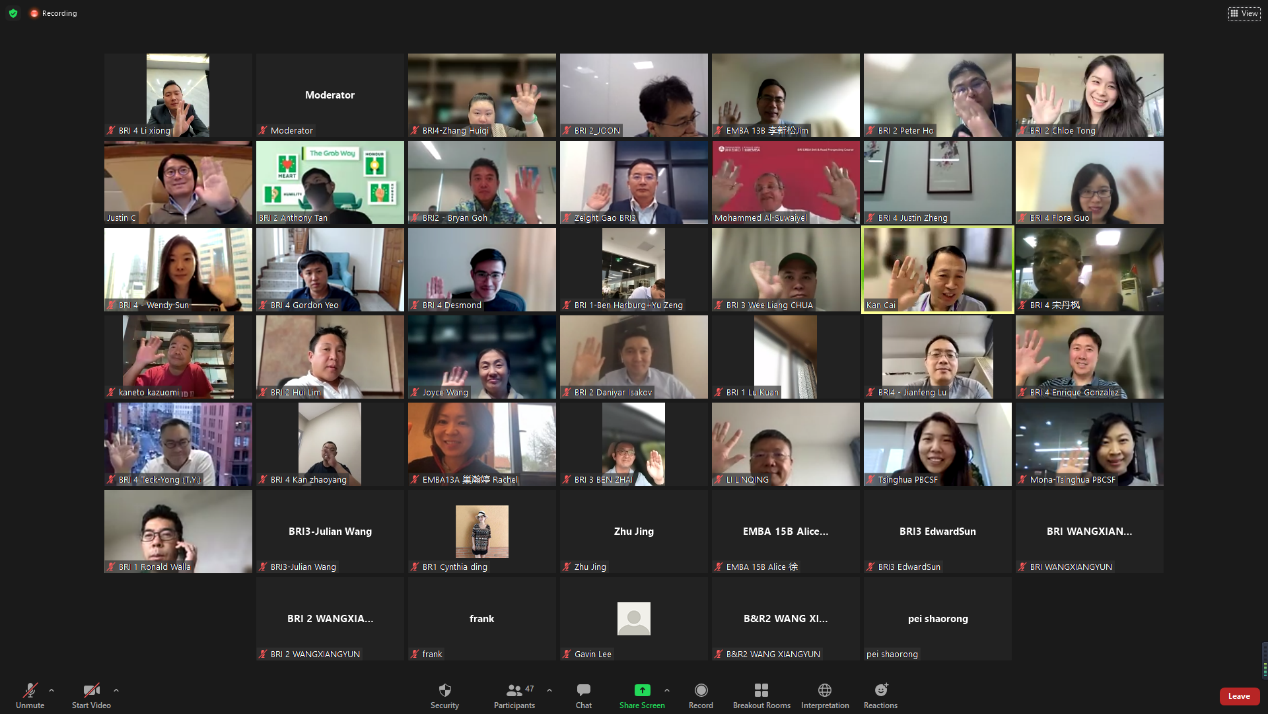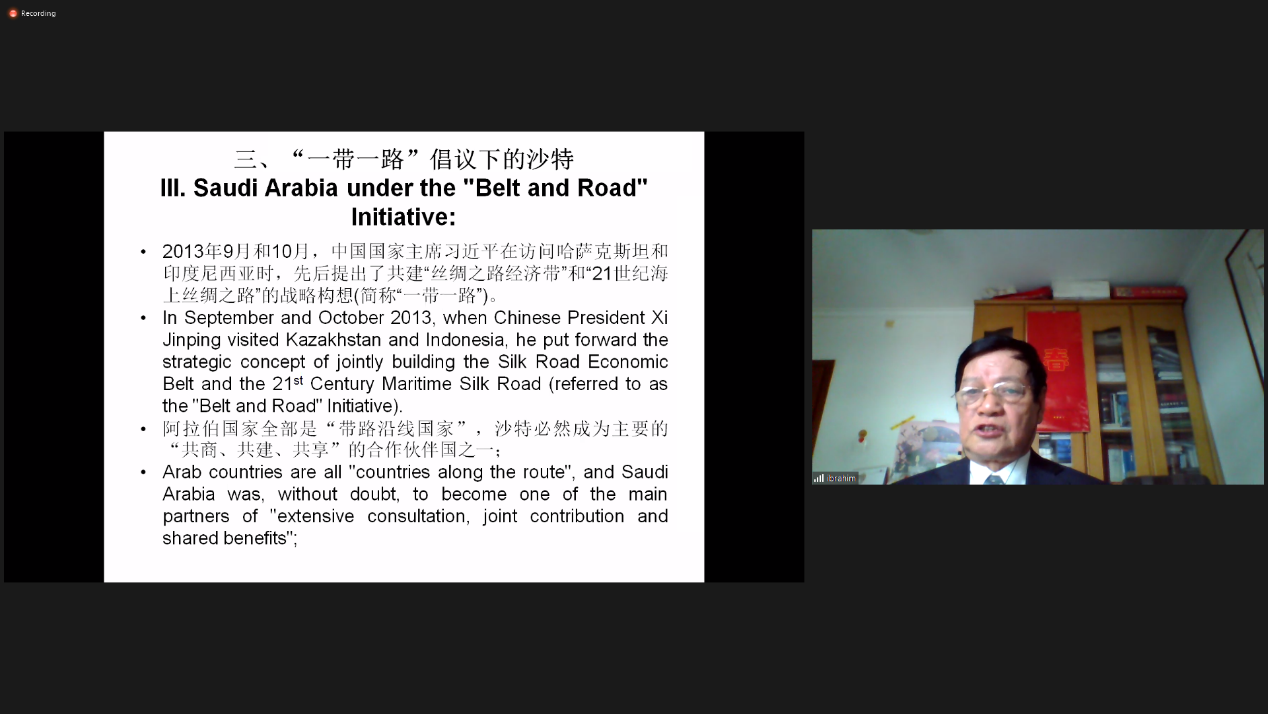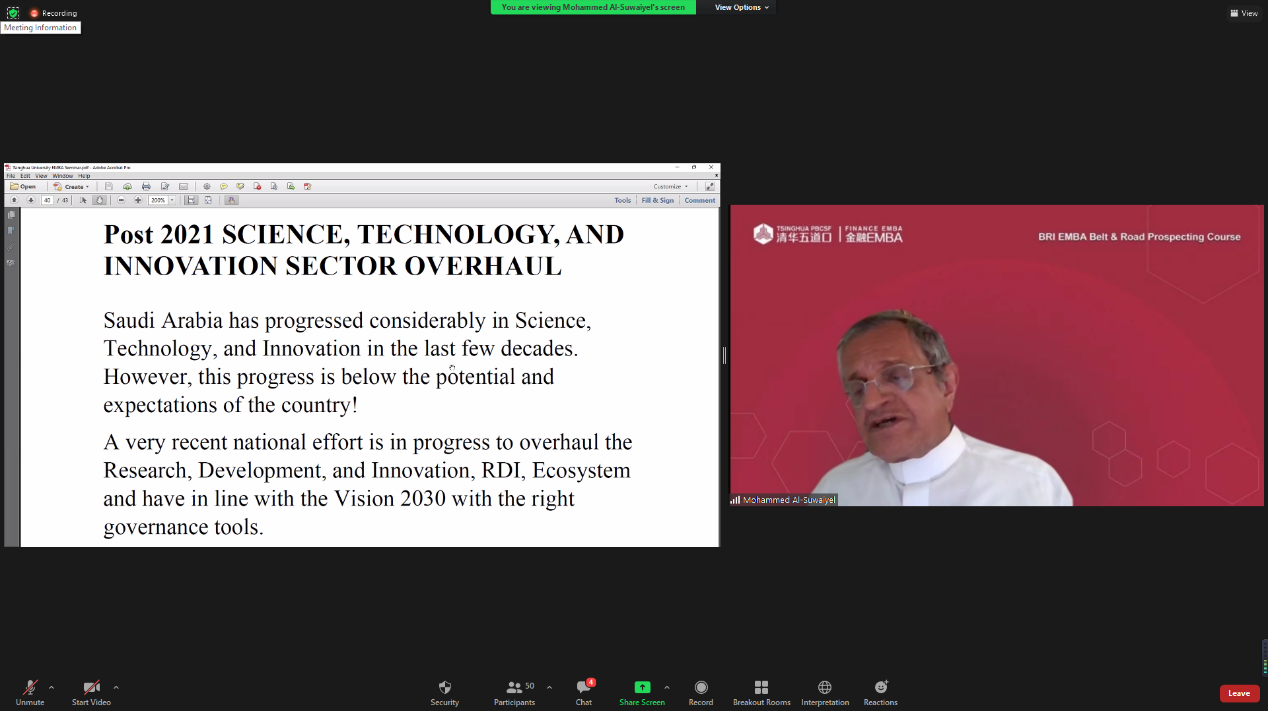On March 22, 2022, the Belt and Road Prospecting course, Tsinghua PBCSF’s newest innovative attempt to continue our EMBA program delivery in the post-pandemic era, commenced its second session – Saudi Arabia - online. More than 50 students from the Tsinghua PBCSF BRI EMBA Program joined the session.

Students from the Tsinghua PBCSF BRI EMBA Program greeting one another during the Belt and Road Prospecting online course of Tsinghua PBCSF.
The Arab world is comprised of a large group of developing countries. All 22 nations in the League of Arab States have established diplomatic relations with China, ranging from Egypt to Saudi Arabia. Based on mutual respect and support over the past 70 years, China-Arab relations have been developing in a friendly and healthy way, with the friendship between both sides continually deepening and the cooperation strengthened.
For this session, two distinguished Saudi experts were invited to share their experiences and insights with the students. Mr. Ibrahim Lee, former Chinese Commercial Counsellor to Saudi Arabia, talked about situating Saudi Arabia in the Belt and Road Initiative. Mr. Mohammed I. Al-Suwaiyel, former Minister of Communications and Information Technology of Saudi Arabia, discussed Saudi Arabia’s Vision 2030 and her science and technology strategy.
Mr. Ibrahim Lee held many important diplomatic and counselling positions in the Arab world. He has worked in commerce in countries such as Syria, Egypt, Kuwait, the UAE, Saudi Arabia, Iraq and Morocco . After retirement, he continued to work on Arab-related affairs, taking many positions as forum host, guest speaker on Arab TV, and commentator on Middle East current affairs including numerous guest appearances on CCTV/CGTN’s Arabic channel.

Mr. Ibrahim Lee addressing the students on the Belt and Road Initiative in Saudi Arabia
Apart from initiatives to strengthen bilateral exchange such as the China-Arab States Cooperation Forum and China-Arab States Expo, Mr. Lee also discussed Vision 2030, a reform initiative Saudi Arabia launched in April 2016 to open a new path for economic diversification. All these efforts align well with the Belt and Road Initiative, allowing for ample space for cooperation.
The Belt and Road Initiative and the strategy of a "Community of Shared Future for Mankind" have been widely supported and welcomed by the governments and people of Arab countries.
Pointing out potential areas for cooperation, Mr. Lee stressed that China-Arab cooperation has entered a new period. “With complementary advantages and common interests, both sides are working towards achieving the ‘two centenary goals’,” he said, “The cooperation between the two sides is indispensable and will see new, great progress under the new situation!”
Mr. Mohammed Ibrahim Al-Suwaiyel served as Minister of Communications and Information Technology of Saudi Arabia until 2017. He is a member of the Board of Economic Affairs and Development, and Chairman of the Board of Directors of Communications and Information Technology Commission. Before entering a career of public services, he was a teaching-award-winning academician in Computer Science after obtaining a PhD in 1979 from the University of Southern California.

Mr. Mohammed Ibrahim Al-Suwaiyel addressing the students on the development of Saudi Arabia
He discussed the development of Saudi Arabia from three specific facets: Vision 2030, growth in the ICT sector, as well as growth in the science, technology and innovation sector. For each case study, he delved into its past planning efforts, challenges and achievements, and targets for the future.
The Belt and Road Prospecting course, co-developed with the Global Family Business Research Center of Tsinghua National Institute of Financial Research, aims to invite relevant experts to participate in all aspects of the course by a BRI country's economic policy makers, embassy/government officials, business leaders and senior scholars, to illustrate to the students the country's social and economic environment, its unique economic and financial as well as sustainable development, and its latest progress, helping the students deepen the understanding of the country's investment environment and business opportunities, so as to construct a better understanding of the Belt and Road Initiative and countries along the route.
The course has started with Session I on Thailand on March 10 and Session II on Saudi Arabia on March 22, and will continue with Session III on Singapore on March 24, and Session IV on UAE on March 25.
Since its inception in May 2017, the Belt and Road Initiative (BRI) EMBA Program has attracted more than 200 high-level enterprise decision-makers from 23 countries and regions, including Singapore, Indonesia, Malaysia, Thailand, the United States, Canada, Kyrgyzstan, Kazakhstan. A number of students from Southeast Asian Countries hold Tan Sri, Dato' Sri, Dato’, Tengku and other honorary titles. Nearly 40% of the students graduated from world-renowned universities such as MIT, Stanford, Harvard, Yale, Cornell, Oxford, Cambridge and Imperial College London.